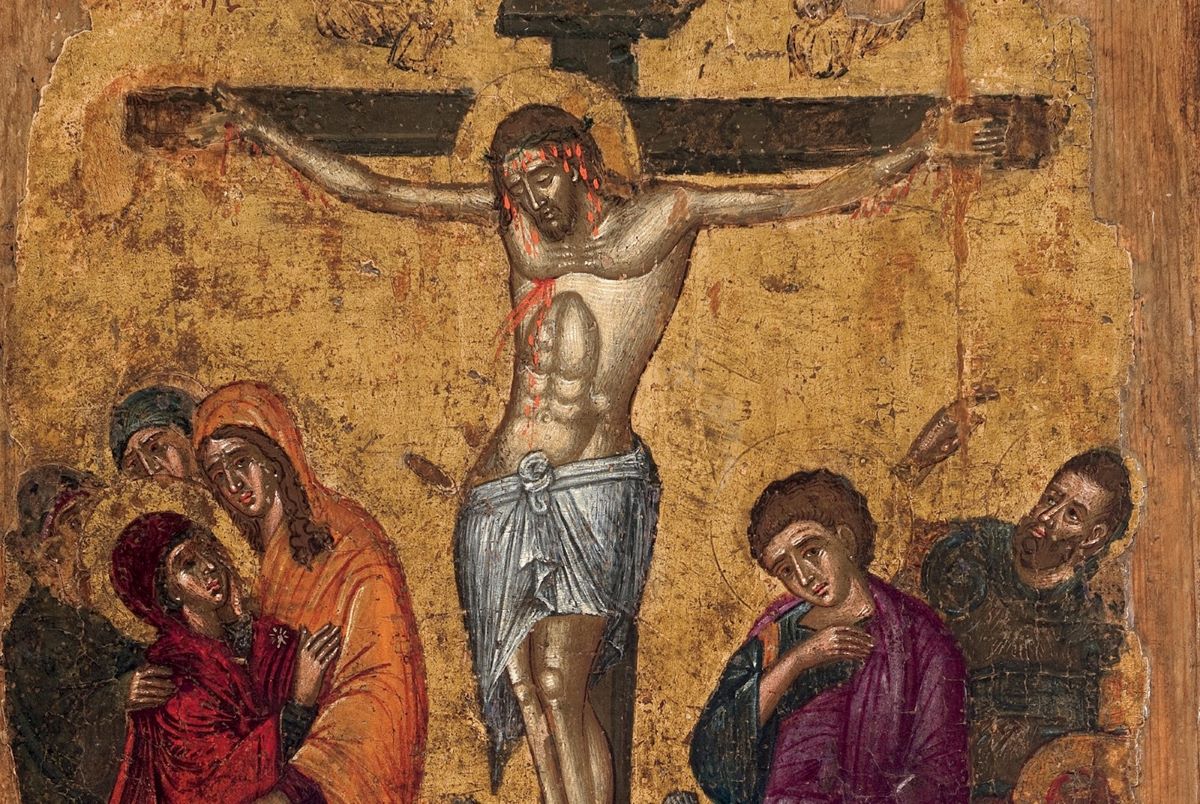Home>Theology and Spirituality>Why Was John The Baptist Important


Theology and Spirituality
Why Was John The Baptist Important
Published: February 20, 2024
Peter Smith, Editorial Director at Christian.net, combines deep insights into faith, politics, and culture to lead content creation that resonates widely. Awarded for his contributions to religious discourse, he previously headed a major organization for religious communicators, enhancing dialogue on faith's societal impacts.
Discover the significance of John the Baptist in theology and spirituality. Explore his role in religious history and his impact on Christian beliefs.
(Many of the links in this article redirect to a specific reviewed product. Your purchase of these products through affiliate links helps to generate commission for Christian.net, at no extra cost. Learn more)
Table of Contents
Introduction
John the Baptist holds a significant place in the history of Christianity and is revered in various religious traditions. His life and teachings have left an indelible mark on the spiritual landscape, influencing countless individuals across generations. Understanding the pivotal role he played in the narrative of Jesus Christ and the early Christian movement is essential for grasping the depth of his impact.
As we delve into the life and legacy of John the Baptist, we embark on a journey that transcends mere historical accounts. His story is intertwined with profound spiritual significance, offering insights into the nature of prophecy, devotion, and the pursuit of righteousness. By exploring the multifaceted aspects of his life, we gain a deeper appreciation for the enduring relevance of his message and mission.
John the Baptist's unwavering commitment to his divine calling and his unorthodox lifestyle set him apart as a compelling figure in religious history. His fearless proclamation of repentance and preparation for the coming of the Messiah resonates with timeless truths that continue to echo through the corridors of faith. As we unravel the layers of his narrative, we uncover the essence of his purpose and the profound impact he had on the spiritual landscape of his time and beyond.
In the subsequent sections, we will journey through the early life and background of John the Baptist, explore his role as a prophet, delve into the transformative baptism of Jesus, examine his enduring influence on Christianity, reflect on his imprisonment and death, and ultimately contemplate the lasting legacy and significance of his life's work. Through this exploration, we will gain a comprehensive understanding of why John the Baptist remains a revered and influential figure in the tapestry of religious history.
Read more: Why Is John The Baptist Important In Advent
Early Life and Background
John the Baptist's early life and background set the stage for his remarkable journey as a pivotal figure in religious history. Born to elderly parents, Zechariah and Elizabeth, John's miraculous conception was foretold by an angel, signaling his extraordinary destiny. His birth, which occurred in the hill country of Judea, was met with profound joy and a sense of divine purpose.
Growing up in a devout Jewish household, John was immersed in the rich tapestry of religious traditions and teachings. His upbringing instilled in him a deep reverence for God and a profound understanding of the scriptures. As he matured, his spiritual inclination became increasingly evident, foreshadowing his future role as a herald of transformative change.
John's ascetic lifestyle and unwavering commitment to his divine calling set him apart from an early age. His choice to dwell in the wilderness, clad in a garment of camel's hair and subsisting on a diet of locusts and wild honey, reflected his detachment from worldly comforts and his singular focus on spiritual pursuits. This unconventional way of life foreshadowed the radical message he would later proclaim to the masses.
The wilderness became a formative backdrop for John's spiritual development, providing him with solitude for introspection and communion with the divine. It was in this secluded setting that he honed his prophetic voice and cultivated a deep sense of spiritual insight. His profound connection to the wilderness mirrored the prophetic traditions of ancient Israel, evoking the imagery of prophets who sought solitude to receive divine revelations.
As John the Baptist emerged from the wilderness and embarked on his public ministry, his background and upbringing infused his message with authenticity and depth. His intimate knowledge of scripture, coupled with his firsthand experience of the wilderness, lent credence to his impassioned calls for repentance and spiritual renewal. This unique blend of spiritual heritage and personal conviction formed the bedrock of his prophetic mission, shaping the trajectory of his profound impact on the religious landscape of his time.
Role as a Prophet
John the Baptist's role as a prophet transcended conventional expectations, embodying the essence of prophetic tradition while ushering in a new era of spiritual awakening. His prophetic calling was characterized by uncompromising courage, unwavering devotion to truth, and a fervent commitment to preparing the hearts of the people for the imminent arrival of the Messiah.
As a prophet, John fearlessly confronted the prevailing social and religious norms of his time, calling for a radical transformation of hearts and minds. His impassioned exhortations for repentance reverberated with an urgency that cut through the complacency of the era, compelling individuals to reevaluate their lives in light of divine truth. His prophetic voice echoed across the Judean wilderness, drawing multitudes who were captivated by his compelling message of spiritual renewal.
Central to John's prophetic mission was his baptism of repentance, a symbolic ritual that signified a profound turning point in the lives of those who partook in it. Through the act of baptism, individuals publicly acknowledged their need for spiritual cleansing and renewal, embracing a transformative journey towards righteousness and inner purification. This symbolic immersion in water served as a powerful catalyst for spiritual awakening, symbolizing the washing away of sin and the emergence of a renewed commitment to God.
John's prophetic ministry also encompassed the bold proclamation of the imminent arrival of the Messiah, heralding a message of hope and redemption to a world yearning for deliverance. His prophetic insight into the coming of the long-awaited Savior ignited a sense of anticipation and preparedness among the people, stirring hearts with the promise of a divine intervention that would usher in a new era of salvation and restoration.
Furthermore, John's prophetic role extended beyond mere words, as he embodied humility and selflessness in his service. His declaration, "He must increase, but I must decrease," encapsulated his profound understanding of his place in the divine narrative, emphasizing the centrality of the Messiah's mission above his own. This humility underscored the essence of true prophetic calling, reflecting a deep commitment to paving the way for the fulfillment of God's redemptive plan.
In essence, John the Baptist's role as a prophet transcended the boundaries of his time, leaving an indelible mark on the collective consciousness of humanity. His prophetic fervor, unwavering commitment to truth, and profound sense of purpose continue to inspire seekers of truth and spiritual renewal, underscoring the timeless relevance of his prophetic legacy.
Baptism of Jesus
The baptism of Jesus by John the Baptist stands as a pivotal moment in the narrative of Christianity, carrying profound theological significance and symbolic depth. As Jesus approached the Jordan River to be baptized by John, a profound exchange unfolded, transcending the physical act of immersion and delving into the spiritual realm.
John initially hesitated, recognizing Jesus' divine nature and feeling unworthy to baptize him. However, Jesus insisted, affirming the importance of fulfilling all righteousness. In that transformative moment, as Jesus emerged from the waters, the heavens opened, and the Spirit of God descended like a dove, alighting upon him. A voice from heaven resounded, declaring, "This is my beloved Son, with whom I am well pleased."
The baptism of Jesus symbolized a profound inauguration, marking the commencement of his public ministry and the affirmation of his divine identity. It served as a powerful manifestation of the Holy Trinity, with the Father's voice, the Son's presence, and the Spirit's descent converging in a transcendent display of divine unity.
Furthermore, Jesus' baptism exemplified his solidarity with humanity, as he willingly participated in a ritual of repentance despite being sinless. In doing so, he sanctified the waters of baptism, infusing them with transformative power and inaugurating a new paradigm of spiritual rebirth and regeneration.
The baptism of Jesus also foreshadowed the sacrament of baptism in Christian tradition, laying the foundation for the sacramental practice that symbolizes the believer's identification with Christ's death, burial, and resurrection. Through baptism, individuals partake in a symbolic immersion, signifying their union with Christ and their participation in the redemptive work of salvation.
Moreover, Jesus' baptism served as a profound revelation of his messianic mission, affirming his role as the long-awaited Savior and the embodiment of God's redemptive plan. It marked the divine endorsement of his earthly ministry, setting the stage for the proclamation of the kingdom of God and the manifestation of God's transformative love and grace.
In essence, the baptism of Jesus by John the Baptist transcended a mere ritualistic act, encapsulating a profound convergence of divine revelation, symbolic significance, and theological depth. It heralded the dawn of a new era, illuminating the path of spiritual renewal and redemption for all who would heed its timeless message.
Influence on Christianity
John the Baptist's influence on Christianity reverberates through the annals of religious history, shaping the foundational tenets of the faith and leaving an indelible imprint on the collective consciousness of believers. His prophetic ministry and pivotal role in baptizing Jesus not only heralded the advent of the Messiah but also laid the groundwork for transformative spiritual practices and theological principles within the Christian tradition.
The baptism of repentance, a central tenet of John's ministry, became a precursor to the sacrament of baptism in Christianity. The act of immersion in water, symbolizing purification and spiritual rebirth, found resonance in the teachings of Jesus and the early Christian community. Baptism emerged as a sacred rite of initiation, signifying the believer's union with Christ's death and resurrection, and serving as a public declaration of faith and commitment to the Christian path.
Furthermore, John the Baptist's unwavering proclamation of repentance and the imminent arrival of the Messiah set the stage for Jesus' ministry, laying the groundwork for the core message of salvation, redemption, and the kingdom of God. The profound impact of John's prophetic voice echoed in the teachings of Jesus, underscoring the continuity between the prophetic tradition of the Old Testament and the fulfillment of divine promises in the New Testament.
John's influence extended beyond his direct interactions with Jesus, permeating the early Christian community and shaping the ethos of discipleship and spiritual devotion. His radical call for inner transformation and ethical renewal resonated with the foundational teachings of Jesus, emphasizing the primacy of love, compassion, and the pursuit of righteousness. The enduring legacy of John's prophetic fervor and moral clarity infused the fabric of early Christian communities, inspiring a commitment to social justice, ethical living, and the proclamation of the gospel message.
Moreover, John the Baptist's martyrdom and steadfast commitment to truth became emblematic of the sacrificial nature of discipleship within Christianity. His unwavering dedication to his divine calling, even in the face of persecution and adversity, served as a poignant example of fidelity to God's redemptive purposes. His martyrdom became a testament to the enduring power of faith and the willingness to bear witness to divine truth, even at great personal cost.
In essence, John the Baptist's influence on Christianity transcends historical chronicles, permeating the spiritual DNA of the faith and illuminating the path of discipleship, spiritual renewal, and unwavering commitment to the transformative message of the gospel. His prophetic legacy continues to resonate in the hearts of believers, underscoring the timeless relevance of his ministry and the enduring impact of his life's work on the tapestry of Christian spirituality.
Imprisonment and Death
The narrative of John the Baptist's life takes a poignant turn as he confronts the stark realities of persecution, imprisonment, and ultimately, martyrdom. His unwavering commitment to truth and righteousness led him into direct conflict with the ruling authorities of his time, culminating in a harrowing ordeal that tested the depths of his faith and resolve.
John's fearless denunciation of moral transgressions and his vocal critique of the political establishment incurred the wrath of Herod Antipas, the ruler of Galilee. His outspoken condemnation of Herod's unlawful marriage to Herodias, his brother's wife, struck at the heart of the ruling elite, challenging their abuse of power and moral decadence. Herodias, nursing a deep grudge against John, seized an opportune moment during a lavish banquet to orchestrate his arrest and subsequent imprisonment.
As John languished in prison, his unwavering faith and unyielding commitment to his prophetic calling remained undimmed. Despite the confines of his cell, his spirit soared free, undeterred by the physical constraints imposed upon him. His imprisonment became a crucible of spiritual fortitude, a testament to the resilience of his convictions in the face of adversity.
The circumstances surrounding John's imprisonment cast a pall of uncertainty over his followers and the broader community. Yet, even in the depths of his confinement, his prophetic voice continued to resonate, stirring hearts and minds with its unwavering call for repentance and righteousness. His indomitable spirit served as a beacon of hope, inspiring others to remain steadfast in their commitment to truth and justice.
Tragically, John's imprisonment culminated in a fateful turn of events that sealed his destiny. Herodias, goaded by her daughter's dance and Herod's ill-fated promise, orchestrated a sinister plot that led to John's unjust execution. The beheading of John the Baptist, a brutal and unjust act, marked the culmination of his earthly journey, shrouding his followers and all who revered him in profound grief and disbelief.
The martyrdom of John the Baptist stands as a testament to the enduring struggle between truth and tyranny, righteousness and corruption. His unwavering fidelity to his divine calling, even unto death, embodies the sacrificial nature of prophetic witness and the profound cost of bearing witness to divine truth in a world fraught with moral compromise and injustice.
In the wake of his tragic death, John's legacy endured, transcending the confines of mortality to inspire generations with the timeless virtues of courage, integrity, and unyielding commitment to the pursuit of righteousness. His martyrdom became a rallying cry for those who championed the cause of justice and moral rectitude, echoing through the corridors of history as a testament to the enduring power of faith in the face of adversity.
Legacy and Significance
John the Baptist's enduring legacy transcends the boundaries of time and space, permeating the collective consciousness of humanity with its profound significance and timeless relevance. His life's work, marked by unwavering devotion to his divine calling and unyielding commitment to truth, continues to resonate as a guiding light for seekers of spiritual truth and moral clarity.
The legacy of John the Baptist is encapsulated in the transformative impact of his prophetic ministry, which reverberates through the annals of religious history. His radical call for repentance and spiritual renewal remains a poignant reminder of the enduring human need for inner transformation and ethical awakening. The baptism of repentance, a central tenet of his ministry, symbolizes the universal yearning for spiritual purification and the quest for a renewed relationship with the divine.
Furthermore, John's pivotal role in baptizing Jesus and heralding the arrival of the Messiah underscores the profound significance of his prophetic mission. His unwavering proclamation of the imminent fulfillment of divine promises ignited a sense of anticipation and preparedness among the people, laying the groundwork for the transformative message of salvation and redemption embodied in the teachings of Jesus.
The enduring significance of John the Baptist's legacy is also evident in his martyrdom, which stands as a testament to the enduring struggle between truth and tyranny, righteousness and corruption. His steadfast commitment to his prophetic calling, even in the face of persecution and unjust imprisonment, embodies the sacrificial nature of prophetic witness and the profound cost of bearing witness to divine truth in a world fraught with moral compromise and injustice.
Moreover, John's influence on Christianity permeates the spiritual DNA of the faith, shaping the foundational tenets of discipleship, spiritual renewal, and unwavering commitment to the transformative message of the gospel. His prophetic fervor, moral clarity, and unwavering dedication to truth continue to inspire believers, underscoring the timeless relevance of his ministry and the enduring impact of his life's work on the tapestry of Christian spirituality.
In essence, the legacy and significance of John the Baptist epitomize the timeless virtues of courage, integrity, and unyielding commitment to the pursuit of righteousness. His enduring influence transcends the confines of historical chronicles, resonating as a timeless beacon of hope and inspiration for all who seek spiritual truth and moral rectitude.














